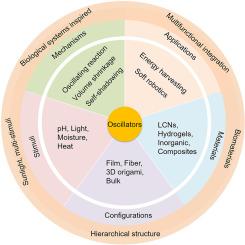Recent advances in flexible self-oscillating actuators
IF 36.6
Q1 ELECTROCHEMISTRY
引用次数: 0
Abstract
Soft actuators are constituted by a type of intelligent materials, and they can generate reversible mechanical motions under external stimuli. They usually achieve continuous actuation by manual turning on or off the power supply, which significantly increases the operation complexity. In contrast, self-oscillating actuators can achieve autonomous motions under constant stimuli, and have recently attained great advancements, as well as promoted the development of autonomous soft robotics. In this review, the latest achievements of soft oscillators are summarized. First, the self-oscillating mechanisms mainly including oscillating chemical reactions and self-shadowing-induced mechanical negative feedback loops are discussed. The oscillators constructed with various materials and configurations, driven by different stimuli and applied in different fields are then presented in detail. Finally, the difficulties and hopes of oscillators are presented. Overall, self-oscillating actuators are in the stage of vigorous development, and we believe that in the future, they will be used in various fields and make many scenarios more intelligent and autonomous.

柔性自振荡致动器的最新进展
软执行器是由一种智能材料构成的,在外部刺激下可产生可逆的机械运动。它们通常通过手动打开或关闭电源来实现连续驱动,这大大增加了操作的复杂性。相比之下,自振荡致动器能在恒定刺激下实现自主运动,近年来取得了长足的进步,并推动了自主软机器人技术的发展。本综述总结了软振荡器的最新成果。首先,讨论了自振荡机制,主要包括振荡化学反应和自阴影诱导的机械负反馈回路。然后,详细介绍了由不同材料和结构构建、由不同刺激驱动并应用于不同领域的振荡器。最后,介绍了振荡器的困难和希望。总之,自振荡致动器正处于蓬勃发展的阶段,相信在未来,它将被应用于各个领域,使许多场景变得更加智能和自主。
本文章由计算机程序翻译,如有差异,请以英文原文为准。
求助全文
约1分钟内获得全文
求助全文

 求助内容:
求助内容: 应助结果提醒方式:
应助结果提醒方式:


